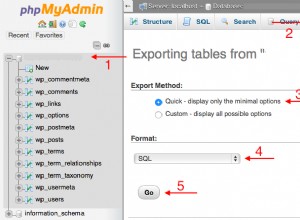Die folgende Funktion ersetzt Bind-Variablen durch neuere Literale, wobei Daten aus GV$SQL_BIND_CAPTURE verwendet werden. Oracle-Bind-Metadaten sind nicht immer verfügbar, daher funktioniert die unten stehende Funktion möglicherweise nicht mit allen Abfragen.
Erstellen Sie die Funktion:
create or replace function get_sql_with_literals(p_sql_id varchar2) return clob authid current_user is
/*
Purpose: Generate a SQL statement with literals, based on values in GV$SQL_BIND_CAPTURE.
This can be helpful for queries with hundreds of bind variables (or cursor sharing),
and you don't want to spend minutes manually typing each variable.
*/
v_sql_text clob;
v_names sys.odcivarchar2list;
v_values sys.odcivarchar2list;
begin
--Get the SQL_ID and text.
--(Use dynamic SQL to simplify privileges. Your user must have access to GV$ views,
-- but you don't need to have them directly granted to your user, role access is fine.)
execute immediate
q'[
select sql_fulltext
from gv$sql
--There may be multiple rows, for clusters or child cursors.
--Can't use distinct with CLOB SQL_FULLTEXT, but since the values will be the same
--we can pick any one of the rows.
where sql_id = :p_sql_id
and rownum = 1
]'
into v_sql_text
using p_sql_id;
--Try to find the binds from GV$SQL_MONITOR. If the values exist, this is the most accurate source.
execute immediate
q'[
--Get the binds for the latest run.
select
case
when name like ':SYS_%' then ':"' || substr(name, 2) || '"'
else name
end name,
case
when dtystr like 'NUMBER%' then nvl(the_value, 'NULL')
when dtystr like 'VARCHAR2%' then '''' || the_value || ''''
when dtystr like 'DATE%' then 'to_date('''||the_value||''', ''MM/DD/YYYY HH24:MI:SS'')'
--From: https://ardentperf.com/2013/11/19/convert-rawhex-to-timestamp/
when dtystr like 'TIMESTAMP%' then
'to_timestamp('''||
to_char( to_number( substr( the_value, 1, 2 ), 'xx' ) - 100, 'fm00' ) ||
to_char( to_number( substr( the_value, 3, 2 ), 'xx' ) - 100, 'fm00' ) ||
to_char( to_number( substr( the_value, 5, 2 ), 'xx' ), 'fm00' ) ||
to_char( to_number( substr( the_value, 7, 2 ), 'xx' ), 'fm00' ) ||
to_char( to_number( substr( the_value, 9, 2 ), 'xx' )-1, 'fm00' ) ||
to_char( to_number( substr( the_value,11, 2 ), 'xx' )-1, 'fm00' ) ||
to_char( to_number( substr( the_value,13, 2 ), 'xx' )-1, 'fm00' ) ||
''', ''yyyymmddhh24miss'')'
else 'Unknown type: '||dtystr
end the_value
from
(
select xmltype.createXML(binds_xml) binds_xml
from
(
select binds_xml, last_refresh_time, max(last_refresh_time) over () max_last_refresh_time
from gv$sql_monitor
where sql_id = :p_sql_id
and binds_xml is not null
)
where last_refresh_time = max_last_refresh_time
and rownum = 1
) binds
cross join
xmltable('/binds/bind' passing binds.binds_xml
columns
name varchar2(128) path '@name',
dtystr varchar2(128) path '@dtystr',
the_value varchar2(4000) path '/'
)
--Match longest names first to avoid matching substrings.
--For example, we don't want ":b1" to be matched to ":b10".
order by length(name) desc, the_value
]'
bulk collect into v_names, v_values
using p_sql_id;
--Use gv$sql_bind_capture if there was nothing from SQL Monitor.
if v_names is null or v_names.count = 0 then
--Get bind data.
execute immediate
q'[
select
name,
--Convert to literals that can be plugged in.
case
when datatype_string like 'NUMBER%' then nvl(value_string, 'NULL')
when datatype_string like 'VARCHAR%' then '''' || value_string || ''''
when datatype_string like 'DATE%' then 'to_date('''||value_string||''', ''MM/DD/YYYY HH24:MI:SS'')'
--TODO: Add more types here
end value
from
(
select
datatype_string,
--If CURSOR_SHARING=FORCE, literals are replaced with bind variables and use a different format.
--The name is stored as :SYS_B_01, but the actual string will be :"SYS_B_01".
case
when name like ':SYS_%' then ':"' || substr(name, 2) || '"'
else name
end name,
position,
value_string,
--If there are multiple bind values captured, only get the latest set.
row_number() over (partition by name order by last_captured desc nulls last, address) last_when_1
from gv$sql_bind_capture
where sql_id = :p_sql_id
)
where last_when_1 = 1
--Match longest names first to avoid matching substrings.
--For example, we don't want ":b1" to be matched to ":b10".
order by length(name) desc, position
]'
bulk collect into v_names, v_values
using p_sql_id;
end if;
--Loop through the binds and replace them.
for i in 1 .. v_names.count loop
v_sql_text := replace(v_sql_text, v_names(i), v_values(i));
end loop;
--Return the SQL.
return v_sql_text;
end;
/
Führen Sie die Funktion aus:
Oracle erfasst nur die erste Instanz von Bindungsvariablen. Führen Sie diese Anweisung aus, bevor Sie die Prozedur zum Löschen vorhandener Bindungsdaten ausführen. Seien Sie vorsichtig, wenn Sie diese Anweisung in der Produktion ausführen, da sie das System vorübergehend verlangsamen kann, da zwischengespeicherte Pläne verloren gehen.
alter system flush shared_pool;
Suchen Sie nun die SQL_ID. Dies kann schwierig sein, je nachdem, wie generisch oder einzigartig die SQL ist.
select *
from gv$sql
where lower(sql_fulltext) like lower('%unique_string%')
and sql_fulltext not like '%quine%';
Fügen Sie schließlich das SQL in die Prozedur ein und es sollte den Code mit Literalen zurückgeben. Leider hat das SQL alle Formatierungen verloren. Es gibt keinen einfachen Weg, dies zu umgehen. Wenn es eine große Sache ist, könnten Sie möglicherweise etwas mit PL/Scope erstellen, um stattdessen die Variablen in der Prozedur zu ersetzen, aber ich habe das Gefühl, dass das lächerlich kompliziert wäre. Hoffentlich hat Ihre IDE einen Code-Verschönerer.
select get_sql_with_literals(p_sql_id => '65xzbdjubzdqz') sql
from dual;
Vollständiges Beispiel mit einer Prozedur:
Ich habe Ihren Quellcode geändert und eindeutige Kennungen hinzugefügt, damit die Abfragen leicht gefunden werden können. Ich habe einen Hinweis verwendet, da geparste Abfragen keine regulären Kommentare enthalten. Ich habe auch die Datentypen so geändert, dass sie Zeichenketten und Datumsangaben enthalten, um das Beispiel realistischer zu machen.
drop table test1 purge;
create table test1(col1 number, col2 varchar2(100), col3 date);
create or replace procedure test_procedure is
C_Constant constant date := date '2000-01-01';
v_output1 number;
v_output2 varchar2(100);
v_output3 date;
CURSOR cFunnyCursor (
v1 NUMBER,
v2 VARCHAR2
) IS
SELECT /*+ unique_string_1 */ * FROM TEST1
WHERE col1 = v1
AND col2 != v2
AND col3 = C_CONSTANT;
begin
open cFunnyCursor(3, 'asdf');
fetch cFunnyCursor into v_output1, v_output2, v_output3;
close cFunnyCursor;
end;
/
begin
test_procedure;
end;
/
select *
from gv$sql
where lower(sql_fulltext) like lower('%unique_string%')
and sql_fulltext not like '%quine%';
Ergebnisse:
select get_sql_with_literals(p_sql_id => '65xzbdjubzdqz') sql
from dual;
SQL
---
SELECT /*+ unique_string_1 */ * FROM TEST1 WHERE COL1 = 3 AND COL2 != 'asdf' AND COL3 = to_date('01/01/2000 00:00:00', 'MM/DD/YYYY HH24:MI:SS')




